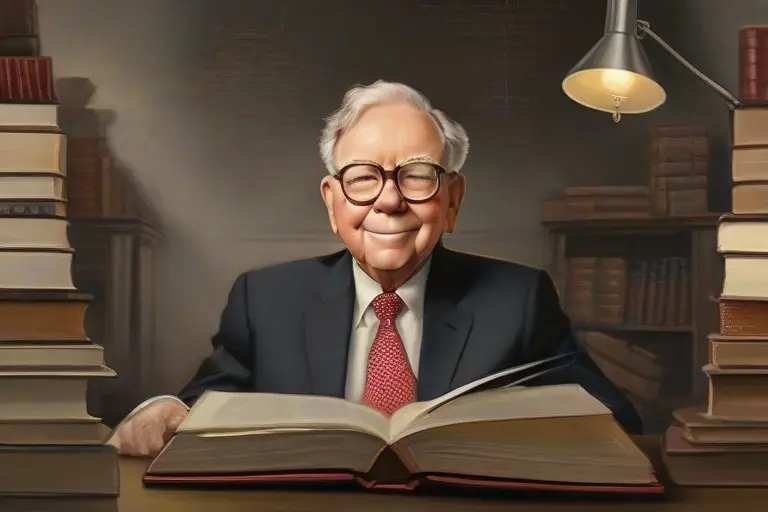Warren Buffett stands out as one of the most exceptional global investors, and his guidance holds immense value!
It’s no wonder people call him the Oracle of Omaha!
He shared his wisdom through yearly letters, interviews, and speeches. Plus, he recommended books that influenced how he thinks and plans. In this article, we’ll share a list of 11 books that Warren Buffett recommends for anyone who wants to learn from the best investors.
Table of Contents
Toggle- Introduction
- 1. Common Stocks and Uncommon Profits by Philip A. Fisher
- 2. Business Adventures: Twelve Classic Tales from the World of Wall Street by John Brooks
- 3. Where Are the Customers’ Yachts? by Fred Schwed
- 4. Essays in Persuasion by John Maynard Keynes
- 5. The Little Book of Common Sense Investing by Jack Bogle
- 6. Poor Charlie’s Almanack: The Wit and Wisdom of Charles T. Munger edited by Peter Kaufman
- 7. The Intelligent Investor by Benjamin Graham
- 8. The Most Important Thing: Uncommon Sense for the Thoughtful Investor by Howard Marks
- 9. The Outsiders by William Thorndike Jr.
- 10. The Clash of the Cultures: Investment vs. Speculation by John Bogle
- 11. Dream Big by Cristiane Correa
- Conclusion
- Disclaimer
Introduction
Warren Buffett, the leader of Berkshire Hathaway, oversees diverse businesses like Geico, Coca-Cola, Apple, and more. He is also committing to donate the majority of his wealth to charitable causes.
Buffett is a voracious reader and a lifelong learner. He has said that he spends about 80% of his day reading and that he reads 500 pages a day. Buffett believes that reading is crucial to his success because it helps him gain knowledge. He has often quoted his mentor, Benjamin Graham, who said: “The more you learn, the more you earn.”
But what does Warren Buffett read? There is a Warren Buffett book? And what books does he recommend for investors who want to follow his footsteps? Here are 11 books that Buffett has endorsed and praised over the years, and why they are worth reading.
1. Common Stocks and Uncommon Profits by Philip A. Fisher

It became a classic in the field of growth investing when published in 1958. Philip A. Fisher was one of the first investors to focus on the quality of the business, rather than the price of the stock.
He advocated for investing in companies that had strong competitive advantages, visionary management, and long-term growth potential.
He also introduced the concept of “scuttlebutt”. This means doing extensive research and talking to various sources to get a deeper understanding of the business.
Warren Buffett has said that he is “85% Graham and 15% Fisher”. He combines the value investing strategy principles of Benjamin Graham with the growth investing approach of Philip Fisher.
He has also said that this book is one of the best books on investing ever written. And that he learned a lot from Fisher’s ideas.
2. Business Adventures: Twelve Classic Tales from the World of Wall Street by John Brooks
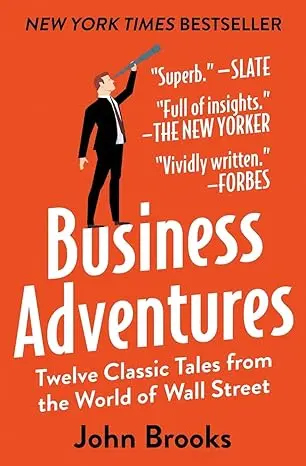
Published in 1969, the book is a collection of 12 stories. Its explores the triumphs and failures of some of the prominent companies and figures in the American business history.
Journalist and writer John Brooks explores topics like the ascent and decline of Xerox, and the Ford Edsel scandal. In addition, the Texas Gulf Sulphur insider trading case, and the rivalry between General Electric and Westinghouse.
He also gives insights into human nature, market psychology, and the lessons we can learn from history.
Warren Buffett has said that this book is his favorite book about business and that he has read it multiple times. He has also gifted it to Bill Gates, who also praised it as a fascinating and informative book.
3. Where Are the Customers’ Yachts? by Fred Schwed
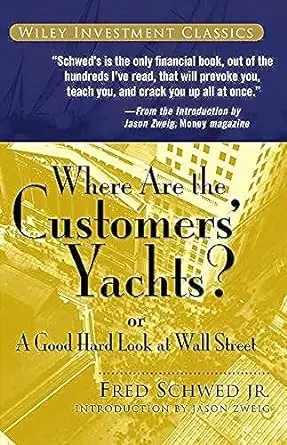
This book, published in 1940, is a humorous and witty critique of the Wall Street culture and the financial industry.
The author is a former trader and broker.
exposes the hypocrisy, greed, and incompetence of professionals who claim to have the best interests of their clients. But, often end up making more money for themselves than for their customers.
He also questions the validity of conventional wisdom, challenging the predictions and advice often provided by experts.
Warren Buffett has said that this book is one of the funniest books about Wall Street and that it contains timeless wisdom and insights.
He has also quoted one of the book’s most famous lines:
“There are certain things that cannot be adequately explained to a virgin either by words or pictures.”
4. Essays in Persuasion by John Maynard Keynes

This book, published in 1931, is a collection of essays and articles.
John Maynard Keynes, one of the most influential economists of the 20th century, wrote it.
He is renowned for promoting government intervention and fiscal stimulus to stabilize the economy in downturns.
Keynes covers a range of topics in his works, including inflation, deflation, unemployment, monetary policy, trade, and politics.
He also analyzes the economic and social consequences of the First World War.
He also study Great Depression and the Treaty of Versailles.
For Buffett, this book is one of the most brilliant books he has ever read. And that he learned a lot from Keynes’ insights and perspectives.
He has also said that Keynes was a great investor as well as a great economist. And that he admired his ability to change his mind when the facts changed.
5. The Little Book of Common Sense Investing by Jack Bogle
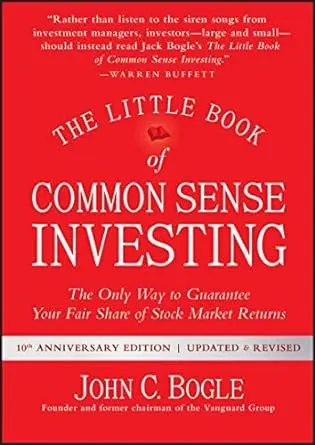
This book, published in 2007, is a concise and practical guide to investing in index funds. Which are funds that track the performance of a market index, such as the S&P 500.
Jack Bogle, was the founder of Vanguard and the pioneer of index investing.
He explains why index funds are superior to actively managed funds. Which are funds that try to beat the market by picking individual stocks or bonds.
He argues that index funds offer higher returns, lower costs, lower taxes, and lower risks than active funds. And that they are the best way for most investors to achieve their long-term financial goals.
Warren Buffett has said that this book is one of the best books on investing for beginners. And that he agrees with Bogle’s philosophy of index investing.
He has also recommended that his own heirs invest 90% of their inheritance in a low-cost S&P 500 index fund.
6. Poor Charlie’s Almanack: The Wit and Wisdom of Charles T. Munger edited by Peter Kaufman
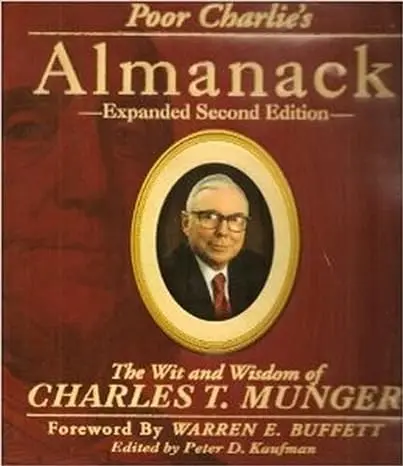
This book, published in 2005.
It is a tribute to Charles T. Munger, the vice chairman of Berkshire Hathaway and Warren Buffett’s longtime partner and friend.
The book contains a selection of Munger’s speeches, essays, letters, and interviews. As well as a biography and a collection of anecdotes and quotes. The book covers Munger’s views on investing, business, philosophy, psychology, ethics, and life.
Warren Buffett has said that this book is a must-read for anyone who wants to learn from Munger’s wisdom and experience. He has also said that Munger is the best partner he ever had and that he owes much of his success to him.
7. The Intelligent Investor by Benjamin Graham
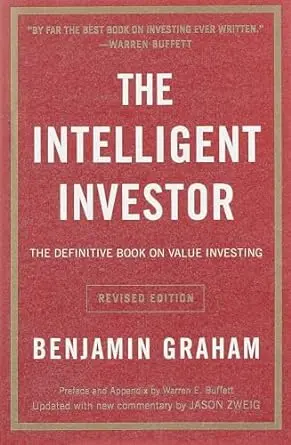
Published in 1949, many widely regard this book as the bible of value investing.
The strategy present involves buying stocks undervalued by the stock market and holding them for the long term.
Considered the father of value investing, Benjamim Grajam and who was Warren Buffett’s mentor and teacher,
He explains the principles and techniques of value investing. Such as the margin of safety, the Mr. Market analogy, and the distinction between the investor and the speculator.
He also provides practical advice and examples on how to analyze stocks, bonds, and mutual funds.
Warren Buffett has said that this book is the best book on investing ever written and that it changed his life. He has also said that he read it when he was 19 and that he still follows its teachings today.
8. The Most Important Thing: Uncommon Sense for the Thoughtful Investor by Howard Marks
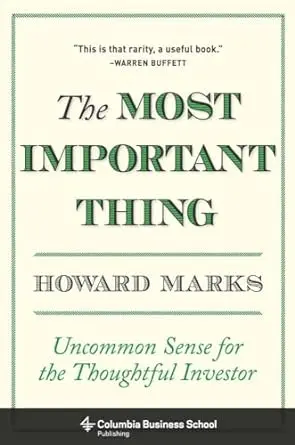
This book, published in 2011, is a compilation of memos written by Howard Marks.
He is the co-founder and co-chairman of Oaktree Capital Management.
The company is one of the largest and most successful investment firms in the world.
Marks provides insightful and candid commentary on the market and the economy.
He shares his thoughts on various aspects of investing, such as risk, return, value, cycles, psychology, and behavior.
He emphasizes the importance of having a clear and consistent investment philosophy and process. And of being aware of one’s own strengths and weaknesses.
Warren Buffett has said it is a rare and valuable book that distills the essence of successful investing.
He learned a lot from Marks’ memos.
He has also said that Marks is one of his favorite writers and thinkers on investing.
9. The Outsiders by William Thorndike Jr.
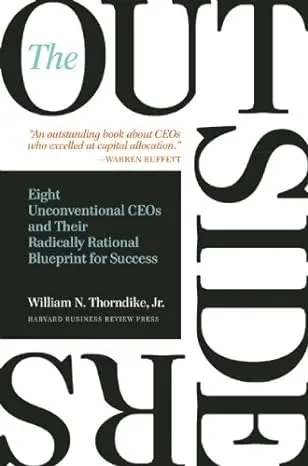
Published in 2012, it is a outstanding book about CEOs. Who achieved extraordinary results by following uncommon and contrarian strategies.
William Thorndike Jr., is an investor and writer.
He profiles the CEOs of companies such as Teledyne, General Dynamics, Capital Cities, and Berkshire Hathaway.
And analyzes how they outperformed their peers and the market by focusing on capital allocation, rather than operational excellence.
He also identifies the common traits and behaviors that made them successful.
Such as being independent, frugal, analytical, and decisive.
For Buffett, this is an outstanding book that shows how CEOs can create enormous value for their shareholders and that he enjoyed reading it. He has also said that he considers himself to be an outsider and that he admires the CEOs featured in the book.
10. The Clash of the Cultures: Investment vs. Speculation by John Bogle
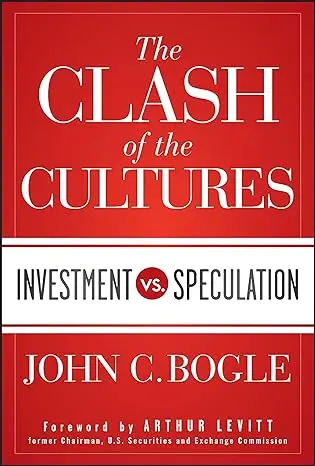
This book, published in 2012, is a critique of the current state of the financial system and the investment industry.
John Bogle, is the founder of Vanguard Group and the pioneer of index investing.
He explains how speculation has taken over investing and how it harms investors and society.
In the book, he argues that investors should return to the principles of common sense and long-term investment, based on the appreciation of companies and not on price fluctuations.
He also denounces the abusive and inefficient practices of fund managers, financial intermediaries, and regulators, who charge excessive fees, generate conflicts of interest, and do not protect the interests of investors.
He proposes a series of reforms to make the financial system more transparent, fair, and efficient.
Warren Buffett recommended this book as a must-read for all investors who want to understand the challenges and opportunities of the current market.
He also praised John Bogle as one of the greatest investor advocates and one of the financial industry’s greatest innovators.
11. Dream Big by Cristiane Correa
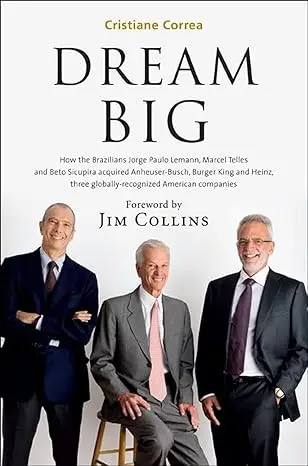
Published in 2013, this biography delves into the story of three Brazilian billionaires – Jorge Paulo Lemann, Marcel Telles, and Beto Sicupira – founders of 3G Capital. The private equity firm acquired and transformed globally recognized brands like Anheuser-Busch, Burger King, Heinz, and Kraft.
Written by journalist Cristiane Correa, the book explores their journey from partners in a small investment bank in Brazil to becoming a highly successful and respected business group worldwide. It unveils their strategies, including a relentless focus on cost-cutting, meritocracy, and long-term vision.
Warren Buffett praised the book for its portrayal of the trio’s achievements and expressed admiration for the 3G Capital team, with whom he has collaborated in deals like the Heinz and Kraft merger.
Conclusion
These are some of the books that Warren Buffett has recommended and praised over the years. Covering a wide range of topics, from investing, business, economics, psychology, to history, biography, and philosophy. The books are not only informative and educational, but also entertaining and inspiring. They can help you to improve your knowledge, skills, and mindset as an investor and as a person.
If you want to learn from Warren Buffett, one of the greatest investors in the world, you should definitely read these books. They will enrich your mind and your portfolio. Happy reading!
Disclaimer
This article serves educational purposes only and is not financial or investment advice. Always consult with a professional before making financial decisions.

